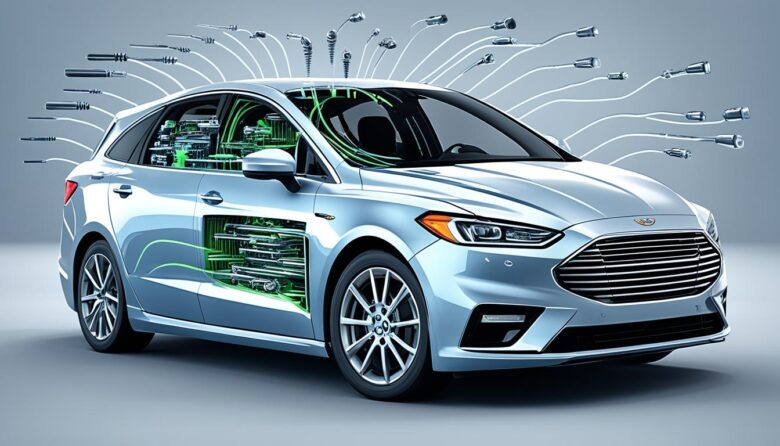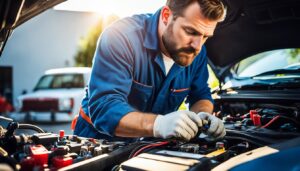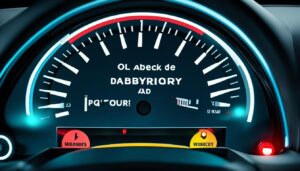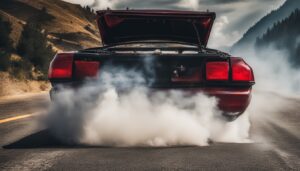When you’re driving, you might hear a strange noise that was new. Some sounds, like tires humming or wipers swishing, are normal. But, some noises mean you should pay attention1. Knowing what these noises mean can help you fix problems early. This article will cover 10 common car noises, what they suggest, and when to see a pro.
Key Takeaways
- Different car sounds can indicate specific issues with the vehicle, such as squealing, whistling, tapping, roaring, rattling, knocking, hissing, grinding, and clunking1.
- Regular auto service ensures an investment is protected and reduces the risk of exposing oneself and loved ones to potential car hazards1.
- Well-maintained cars result in lower upkeep costs1.
- It’s crucial to address car noise issues promptly to avoid further damage and ensure safe driving conditions2.
- Ignoring car noises can lead to more expensive repairs down the line.
Strange Sounds Under the Hood
Your car’s engine makes many sounds, each with its own meaning. Knowing these engine noises helps you spot and fix problems early3.
Hissing Noise
A hissing sound under the hood, especially after stopping, means a fluid leak. This could be in the cooling system or vacuum system3. If it hisses while running, it’s likely a vacuum line, hose, or fitting leak3.
These leaks let air in, hurting engine performance and efficiency3.
Squealing or Chirping Sound
A high-pitched squealing or chirping noise often means a serpentine belt or pulley issue. It could be low belt tension, a worn belt, or accessory problems like the alternator or air conditioner3. This sound gets louder when you speed up3.
“Prompt attention to unusual car noises can help prevent major breakdowns and costly repairs down the line.”
Being alert and fixing strange sounds early saves time, money, and trouble. Regular checks and quick fixes keep your car running well4.
Clicking Noise and Car Won’t Start
If your car clicks when you try to start it, it usually means the battery is dead or the connections are bad5. This noise shows the starter is trying to turn but lacks enough power from the battery56.
A dead or dying battery is often why a car won’t start but clicks a lot6. Problems with corroded or loose battery terminals can also stop power from flowing right and cause starting issues6. Sometimes, a faulty starter or starter relay makes a single loud click instead of many6.
To figure out the problem, you might want to try jump starting the vehicle or check the battery and its connections5. A cold cranking test with a multimeter can show if the battery is the issue, with a reading under nine volts meaning there’s a battery problem5. Regularly checking and cleaning battery terminals can stop corrosion and keep connections good56.
Fixing the root cause, like a dead battery, faulty starter, or corroded connections, will get your car running again. This avoids the annoyance of a clicking noise that stops it from starting567.
Rattling Noises
When your car starts making rattling sounds, it’s important to address the issue quickly. These noises can come from loose items in the trunk or serious problems with the exhaust system or suspension8.
A failing catalytic converter is a common cause of exhaust system rattles. It can make sounds like rattling and might cause you to fail emissions tests8. Loose hangers, a damaged catalytic converter, or worn exhaust parts can also make the exhaust system rattle9.
Rattling noises can also come from suspension issues. Over time, parts like control arm bushings and tie rods can wear out. This leads to rattling or clunking noises from the suspension8. Sometimes, a piston slap can cause a clacking rattle noise, needing a full engine rebuild8.
It’s crucial to get any rattling noises checked by a professional. Ignoring them can lead to more serious and expensive repairs later. Fixing the issue quickly keeps your vehicle safe and running well9.
| Potential Cause | Description | Impact |
|---|---|---|
| Failing Catalytic Converter | As the catalytic converter wears out, it can create sounds resembling rattling noises. | Potential failure of emissions tests8. |
| Worn Suspension Components | Over time, components like control arm bushings, tie rods, and shocks can wear out, leading to rattling or clunking noises. | Decreased vehicle stability and handling8. |
| Piston Slap | A gap between the pistons and the cylinder wall due to wear and tear can create a clacking rattle noise. | Requires a complete engine rebuild to fix8. |
Understanding the causes of rattling noises and fixing them quickly keeps your vehicle running smoothly and ensures your safety9.
“Regular maintenance and prompt attention to any rattling noises can go a long way in preserving the life and performance of your vehicle.”10
Experts at Paul’s Auto Repair have over 50 years of experience fixing rattles, knocks, and vibrations in vehicles10. They suggest regular oil changes and high-quality engine oil to prevent piston slap. They also recommend fuel injector cleaning or replacement every 50,000 miles for clogged injectors10. Worn pulleys can cause loud noises from the engine, which might need replacing10.
Car Noises
Strange noises from your car can mean there are problems. Sounds like a humming or whirring might point to issues with the differential, transmission, or wheel bearings11.
If you hear a humming or whining sound, it could mean the differential needs oil, the transmission is failing, or a wheel bearing is worn out12. It’s important to get a pro to check these noises to stop more damage and keep your car running well.
| Noise Type | Possible Cause | Recommended Action |
|---|---|---|
| Humming or whirring | Differential issues | Inspect and lubricate the differential |
| Whining | Transmission problems | Have the transmission inspected and repaired |
| Grinding or rumbling | Wheel bearing failure | Replace the worn-out wheel bearing |
Don’t ignore these sounds, as they can turn into bigger problems if not fixed12. Fixing car noises quickly can save you from expensive repairs and keep your car safe and healthy12.
Regular maintenance and quick action on strange sounds can help your car run smoothly and prevent big problems later12.
Squealing or Screeching When Braking
If your car makes a high-pitched squealing or screeching sound when braking, it means your brake pads need attention. This noise usually comes from a small metal tab on the brake pad rubbing against the rotor. It tells you the pad material is worn down13. This is the main reason brakes squeak13. But, weather, road conditions, wrong brake installation, or debris between the pads and rotors can also cause this noise13.
As brake pads wear down more, the sound might turn into a grinding or scraping noise. This means the brake components’ bare metal is touching13. This could lead to expensive rotor damage14. Driving fast and braking hard often can also make brake pads glaze over, reducing friction and needing replacement14.
Brake squealing can come from worn brake pads, brake rotor damage, and other brake system issues131415. It’s crucial to get any brake noises checked by a pro to find the cause and stop more damage131415.
Some squeaking from moisture or heavy use is normal, but sudden or getting worse squeaking means it’s time for a brake check13. Things like lack of lubrication, debris, and wrong installation can cause brake squealing131415. Fixing these issues quickly helps keep your brakes working well and your ride smooth, safe, and quiet131415.
Roaring Sound When Accelerating
A roaring sound that gets louder when you press the gas is usually from your exhaust or transmission. More than half of loud noises when speeding up come from a damaged exhaust system16. If your exhaust has cracks or holes, engine noise can leak out, making a loud roar.
But, it could also mean there’s a problem with the transmission. About 15% of loud noises while speeding up come from transmission issues16. If you hear a roar but don’t see an exhaust leak, it might be the transmission. It could be shifting wrong, making the engine rev up and sound loud. This might be because of fluid problems, worn parts, or misaligned gears in the transmission16.
Exhaust System Leak
A roaring sound that gets louder when you speed up is often from an exhaust leak17. An exhaust problem is a common reason for a loud roar when you accelerate17. Cracks or holes let engine noise escape, making a loud roar.
Transmission Issue
If the roaring noise happens when you speed up but there’s no exhaust leak, it could be a transmission issue. Transmission problems cause nearly 15% of loud noises when speeding up16. The transmission might not shift right, causing the engine to rev up and make a loud roar. This could be from fluid issues, worn parts, or misaligned gears in the transmission16.
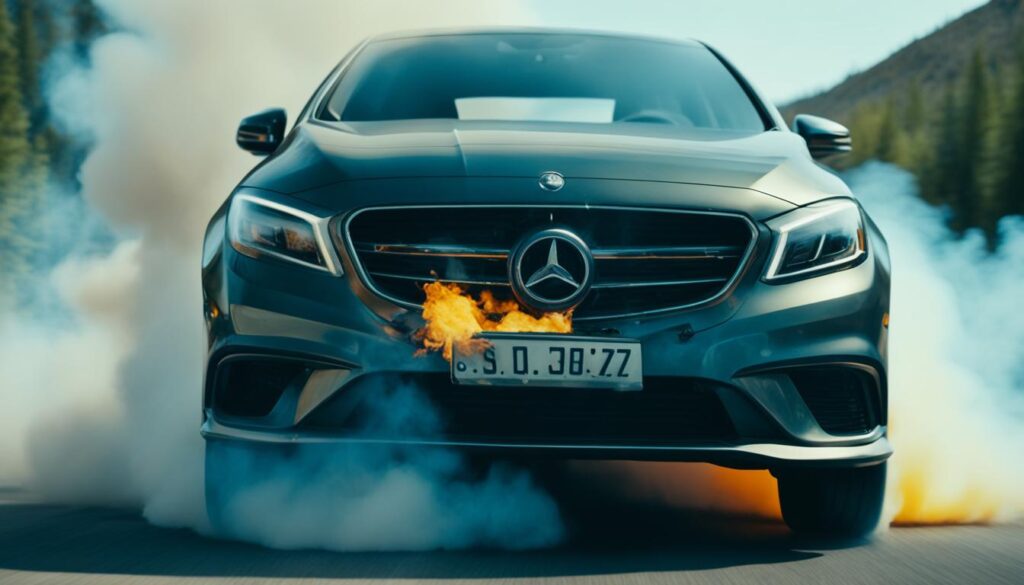
Engine Knocking
Engine knocking sounds like a rapid tapping or pinging noise. It’s a worrying sign for car owners. This problem can come from using low-octane fuel, bad spark plugs, carbon buildup, or serious engine issues18.
Using fuel that’s not right for your car is a big reason for engine knocking18. This can cause the air-fuel mix to ignite too early, leading to a knocking sound. This sound can damage engine parts, which can be expensive to fix18.
Other things like old spark plugs, carbon buildup, or engine problems can also cause knocking18. These issues mess with the engine’s smooth running, making it knock.
| Potential Causes of Engine Knocking | Preventive Measures |
|---|---|
|
If engine knocking doesn’t stop after fixing the fuel issue, get a pro to check it out. They can find the real cause and suggest fixes to avoid engine damage181920.
“Ignoring engine knocking can lead to catastrophic engine failure, so it’s crucial to address the issue as soon as possible.”
Regular maintenance and quick action on engine noises can reduce the risks of engine knocking. This keeps your car reliable and performing well181920.
Strange Sounds When Turning
Unusual noises like squeaking, clicking, clunking, or groaning when turning the steering wheel often indicate problems with the steering and suspension systems21. These sounds can be caused by worn-out constant velocity (CV) joints, issues with the power steering system, or other suspension component failures22. It’s important to fix these problems quickly to avoid more damage and keep your car safe to drive.
Power steering failure is often the main cause of car squeaking when turning. This leads to more noise during turns and makes steering harder21. Sounds can also come from low or contaminated power steering fluid, which hurts the system’s performance and causes annoying noises21. Worn-out suspension components like shocks, struts, and bushings can also cause noises, showing they need checking and possibly replacing for better ride comfort, handling, and safety21.
A steering wheel belt that’s worn can cause squeaks when turning, highlighting the need for regular checks and timely replacements for quiet turns and good steering21. Sometimes, noises when turning come from driving on uneven or rubber road surfaces, making tires rub and squeak, which isn’t a big worry for your car but affects how it sounds21.
If you hear crunching or creaking from one side when turning, it might be due to bad CV joints, bushings, or ball joints22. The power steering system could be the issue if you hear screeching or whining in any direction22. The tie rods and sway bar link might be the problem if you hear popping, knocking, or cracking22.
Whining noises when turning are usually signs of power steering problems23. Popping noises at low speeds often come from worn out or broken suspension joints23. Clicking, crunching, humming, or grinding at higher speeds can mean issues with bearings, CV joints, or differentials23. Screeching, squealing, or whining noises when turning are often due to power steering system problems like loose belts or low power steering fluid23.
A bad CV joint can make a clicking sound that matches wheel speed when turning sharply23. CV joints often show signs with a clicking sound that gets worse over time before they fail completely23.
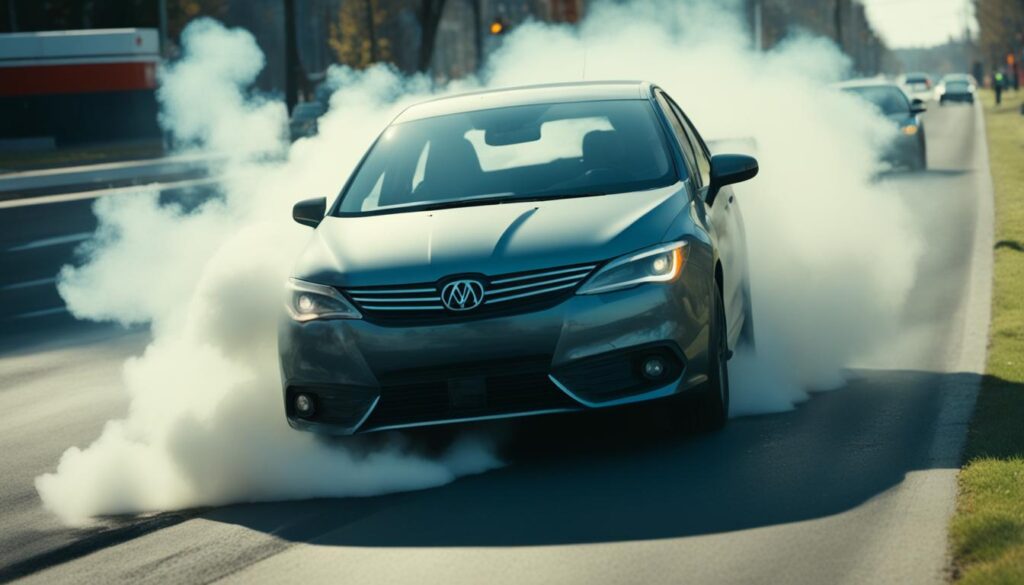
| Noise Type | Possible Cause |
|---|---|
| Whining | Power steering issues23 |
| Popping at low speeds | Worn out or broken suspension joints23 |
| Clicking, crunching, humming, or grinding at higher speeds | Problems with bearings, CV joints, or differentials23 |
| Screeching, squealing, or whining | Power steering system problems like loose belts or low power steering fluid23 |
| Clicking rhythmic with wheel speed when turning sharp corner | Bad CV joint23 |
“Prompt diagnosis and repair of these issues is important to prevent further damage and ensure safe vehicle handling.”
Fixing strange sounds when turning is key to keeping your car’s steering and suspension systems in good shape. This ensures a smooth, safe, and fun drive. By knowing what could cause these sounds and fixing them quickly, you can avoid expensive repairs and keep your car running well212223.
Thumping or Knocking Noise
As you drive, a thumping or knocking noise grabs your attention. It makes you wonder what’s wrong with your car. This sound could mean a big problem, so it’s important to fix it fast 1.
Wheel Bearing or Tire Issue
A thumping or knocking noise might come from your wheel bearings or tires. Worn-out wheel bearings make a rhythmic sound, especially when you’re going fast24. Also, a tire with a flat spot, not enough air, or misalignment can cause a similar noise24. Checking your tires and wheel bearings can show you where the noise is coming from.
- Worn wheel bearings can cause a rhythmic thumping or knocking noise24
- Flat spots on tires, underinflation, or misalignment can also produce a thumping or knocking sound24
- Checking the tires and wheel bearings can help pinpoint the cause of the noise
Fixing these problems is key to keeping your car safe and running well. Wheel alignment costs about £44.25 on average, while fixing suspension or starter motor mounts can be £127.40 or £308.8825. Brake rotor replacement, which might help with the noise, costs about £440.9325.
By being alert and fixing the noise early, you can keep your car running smoothly and safely. Taking care of these issues quickly can also save you from more damage and expensive repairs later.
Conclusion
Listening to your car’s sounds and fixing any strange noises quickly is key for keeping your vehicle safe and well-maintained. Some sounds are normal, but others can warn of bigger problems that need a pro’s touch26.
Knowing what car noises mean can help you fix issues early, saving you money later. A hissing sound might mean a radiator leak, while a whining engine could be a loose belt26. A clicking noise might point to engine problems, and a grinding sound could mean brakes need work26.
Make sure to keep up with your car’s maintenance and get a trusted mechanic to check out any weird sounds. This way, you can avoid big repairs and drive safely and comfortably27.
FAQ
What does a hissing sound under the hood mean?
What causes a high-pitched squealing or chirping noise from under the hood?
What does a clicking noise when trying to start the car mean?
What can cause a rattling noise in the car?
What do strange humming, whirring, or whining noises indicate?
What does a screeching or squealing sound when braking mean?
What can cause a roaring sound that increases in volume as you accelerate?
What does engine knocking mean?
What can cause unusual noises like squeaking, clicking, clunking, or groaning when turning the steering wheel?
What can cause a thumping or knocking noise from the vehicle?
Source Links
- https://www.supremechevy.com/listen-out-for-these-9-car-sounds-you-shouldnt-ig.html?srsltid=AfmBOop7-ik9GKqFFQp8jGfkOkL5zAZ-4rSaUnscE_roAP3kjA46-jzO – Listen Out For These 9 Car Sounds You Shouldn’t Ignore
- https://caliberautocare.com/auto-repair/what-do-these-car-noises-mean/ – Common Car Noises and What They Mean, Car Diagnosis | Caliber Auto Care.com
- https://vatire.com/car-maintenance-tips/common-car-noises-and-what-they-mean/ – 10 Common Car Noises & What They Mean | Virginia Tire & Auto
- https://living.geico.com/driving/auto/auto-care/car-noises/ – 7 Car Noises You Should Never Ignore
- https://www.infinitiofcoolsprings.com/blogs/739/why-does-my-car-make-a-clicking-sound-when-i-try-to-start-it/ – INFINITI OF COOL SPRINGS
- https://www.firestonecompleteautocare.com/blog/maintenance/car-wont-start-clicking-noise/ – Clicking Sound When Trying to Start the Car
- https://radair.com/blog/2024/04/17/my-car-wont-start-clicking-noise/ – My Car Won’t Start and There’s a Clicking Noise | Rad Air
- https://www.firestonecompleteautocare.com/blog/maintenance/car-making-rattling-noise/ – Why is My Car Making Rattling Noises?
- https://www.wikihow.com/Car-Makes-a-Rattling-Noise – Why Your Car Makes a Rattling Noise: 17 Potential Reasons
- https://www.paulsautorepair.com/blog/car-making-rattling-noise/ – Car Making a Rattling Noise? “Why is My Car Rattling?” [Answers]
- https://www.firestonecompleteautocare.com/blog/maintenance/car-noises-what-they-mean/ – 8 Car Noises: What They Mean & If You Should Worry
- https://www.supremechevy.com/listen-out-for-these-9-car-sounds-you-shouldnt-ig.html?srsltid=AfmBOoonepllUfsKdvXdiblykSFkl3AWp0vRfRJhQN8e3-E7B_r0CTwI – Listen Out For These 9 Car Sounds You Shouldn’t Ignore
- https://www.firestonecompleteautocare.com/blog/brakes/why-squeaky-brakes/ – Why Are Your Brakes Squeaking and How to Fix Them
- https://nubrakes.com/blog/6-reasons-your-brakes-are-squeaking/ – 6 Reasons Your Brakes Are Squeaking
- https://www.elgincdjr.com/how-to-fix-squeaky-brakes.htm – How to Fix Squeaky Brakes | Vehicle Service
- https://jackstoldtauto.com/car-making-loud-noises-when-accelerating-heres-what-could-be-wrong/ – Reasons Why Vehicles Make Loud Noises While Accelerating
- https://www.gregs.com/10-noises-car-shouldnt-making/ – 10 Noises Your Car Shouldn’t Be Making | Greg’s Japanese Auto
- https://www.aamcoblog.com/Article/What-To-Do-When-Engine-Sounds-Give-You-the-Chills – What To Do When Engine Sounds Give You the Chills
- https://www.aamcobayarea.com/Blog/Article/whats-that-knocking-sound-coming-from-my-car – What’s That Knocking Sound Coming from My Car?
- https://www.scottsfortcollinsauto.com/reasons-why-your-engine-is-knocking-causes-and-solutions/ – Reasons Why Your Engine Is Knocking: Causes and Solutions | Scott’s Fort Collins Auto
- https://fixautousa.com/blog/car-makes-noise-when-turning/ – 5 Reasons Your Car Makes Noise When Turning – Fix Auto USA
- https://www.wikihow.com/Car-Makes-Noise-when-Turning – 8 Reasons Your Car Makes Noise When Turning
- https://gobdp.com/blog/why-is-their-noise-when-turning-my-steering-wheel/ – Why is There Noise When Turning my Steering Wheel? – BlueDevil Products
- https://community.cartalk.com/t/rhythmic-thumping-noise-when-cars-moving/79740 – Rhythmic thumping noise when car’s moving
- https://www.whocanfixmycar.com/advice/why-is-my-car-making-a-thumping-noise – Why Is My Car Making a Thumping Noise?
- https://www.stevensjerseycityford.com/blog/2022/october/25/rattle-whirr-and-other-car-noises-you-shouldnt-ignore.htm – Rattle! Whirr! And Other Car Noises You Shouldn’t Ignore
- https://www.supremechevroletwest.com/9-car-noises-that-shouldnt-be-neglected.html – 9 Car Noises That Shouldn’t Be Neglected
